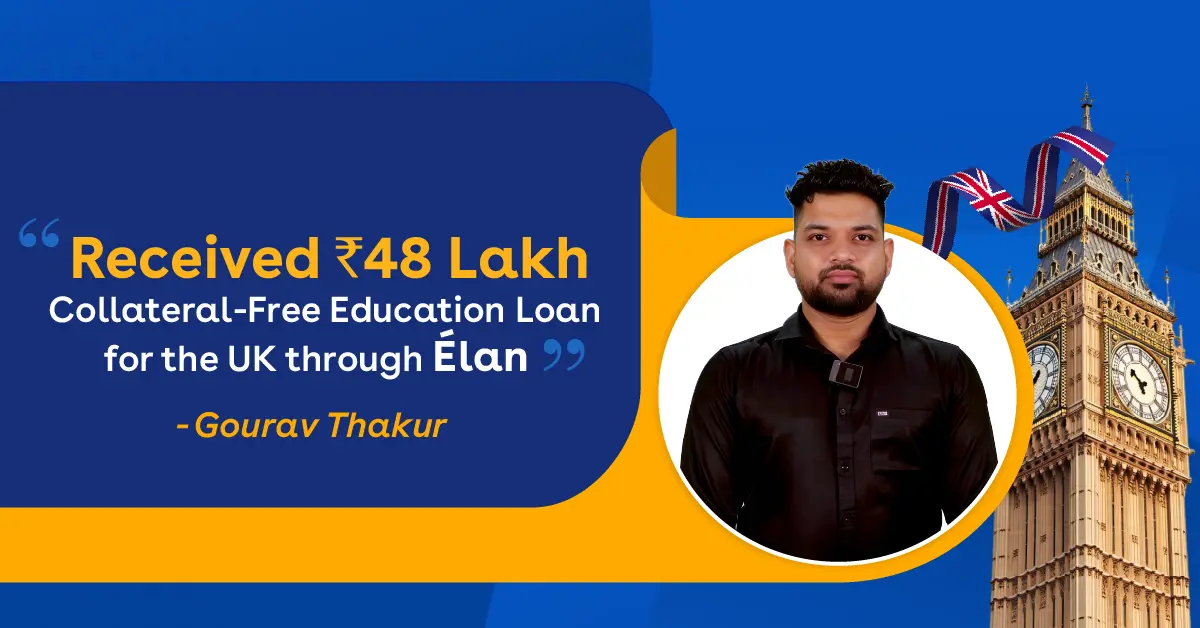Apr 23, 2022
How to Get Overseas Education Loan Without Collateral?
Studying abroad is no longer a missed dream for Indian students - it is becoming a reality. From Ivy League universities in the US to modern campuses in Australia and Europe, 2025 is seeing a surge in Indian students packing their bags for global education.
While the ambition of Indians is high but so is the cost! Tuition fees, living expenses, flights - it all adds up quickly. But thanks to non-collateral education loans for abroad, that students from even the weakest sections of society can also take the courage to study abroad.
Let us go ahead with the article and see how these non collateral education loan to study abroad are helping thousands of young aspirants to move ahead without financial baggage and chase their international dreams without putting family property or assets on the line.
Why Students are Opting for Overseas Education Loans Without Collateral?
Like stepping onto an electric scooter in a busy city for speed and agility, let us look at why Indian students are choosing non-collateral loans.
Speed & Flexibility: Most unsecured loans process faster than traditional ones because there is no need for property verification.
Protects Family Assets: You don’t have to offer your home or a vehicle as collateral.
More Lenders Are Joining In: Banks, NBFCs, and global loan providers are all offering student-centric unsecured options.
More eligibility based on student profile: Your academics and university offer matter more than your asset holdings.
Ideal for First-Generation Learners: Many students today come from families that may not own significant assets. Unsecured loans open doors for them without financial barriers.
Supports a Wider Range of Courses and Countries: Non-collateral overseas education loans are now being offered for diverse programs, even in non-traditional study destinations, giving students more freedom to choose what and where they want to study.
Eligibility Criteria for Overseas Education Loans Without Collateral
To avail this education loan, there are certain criteria that need to be met by the student and co-applicants applying for this loan.
For Student:
The student applying for the loan must be 18 years old or above.
The student must have admission to a reputed and recognised institute
The student’s academic profile should meet the eligibility criteria laid out by the Banks and NBFCs. They scrutinize the academic profile, secondary and higher secondary certificates, as well as English language requirements, GRE, IELTS, TOEFL, etc.
For co-applicant:
The co-applicant must have a fixed income.
Financial documents such as ITR, Salary slips, and bank account statements of the co-applicant are necessary.
Top Lenders Offering Overseas Education Loans Without Collateral
From Public banks to International lenders, below is a table showing the top lenders offering non-collateral education loan to study abroad:
|
Lender |
Max Loan Amount |
Repayment Tenure |
Interest Rate |
Pre-Visa Disbursement |
Moratorium Period |
Co-applicant Required |
|
State Bank of India |
Up to Rs. 50 Lakhs |
Up to 15 years |
9.65% |
Not typically available |
Course Duration + 6 months |
Yes |
|
Union Bank of India |
Up to Rs. 40 Lakhs |
Up to 15 years |
9.25% |
No Particular norms |
Course Duration + 12 months |
Yes |
|
Axis Bank |
Up to Rs. 1 Crores |
Up to 15 years |
11% to 13% |
Available in select cases |
Course Duration + 12 months |
Usually required |
|
IDFC First Bank |
Up to Rs. 75 Lakhs |
Up to 15?years |
11% - 13.25% |
Available |
Course Duration + 12 months |
Yes |
|
ICICI Bank |
Up to Rs. 1 Crores |
Up to 15 years |
USA: 11.25%
|
Available |
Course Duration + 6 months |
Usually required |
|
HDFC Credila |
Up to Rs. 75 Lakhs for USA
|
Up to 15 years |
11.5% to 12.75% |
Available |
Course Duration + 12 months |
Mandatory co-applicant |
|
Avanse |
Up to Rs. 75 Lakhs for USA
|
10 to 14 years |
11.5% - 14% |
Available |
Course Duration + 12 months |
Yes |
|
MPower Financing |
Up to $100,000 |
Up to 10 years |
Masters: 11.99% (fixed)
|
Yes |
Course Duration + 6 months |
No |
|
Prodigy Finance |
Up to $220,000 per student |
Up to 20 years |
Masters: 10.55% - 14.5% (fixed) |
Yes |
Course Duration + 6 months |
No |
Note: non-collateral education loan interest rate may vary based on profile, university, and course, and the Moratorium periods generally cover the course duration plus an additional 6–12 months. Additionally, International lenders often do not require collateral or co-applicants, making them ideal for students from asset-light backgrounds.
Factors Affecting Chances of Getting Overseas Education Loan Without Collateral
Getting an education loan without collateral is like pitching yourself to an investor—what you bring to the table matters. Here is what lenders closely evaluate:
Academic Performance and Test Scores
A high GPA, GRE, or IELTS score tells lenders that you are serious about your studies and statistically more likely to complete your course and land a job post-study.
Course and University Ranking
Programs with high ROI and globally ranked universities give lenders confidence that you will be employable and earn enough to repay without defaults.
Co-applicant Income & Credit History
Even without collateral, lenders need financial backup. A co-applicant with steady income and a strong CIBIL score shows repayment won't be a problem if you face delays post-study.
Country and Visa Approval Rate
Destinations like the USA, Canada, and the UK, with higher visa success and post-study work options, are seen as low risk, improving your loan approval chances.
Student’s Future Earning Potential
Opting for in-demand fields like STEM, AI, or Healthcare assures lenders that your salary prospects post-graduation will support timely repayment.
Now that we have seen all the factors that can affect the approval of getting an overseas education loan without collateral, let us go ahead and list the steps to applying.
Steps to Apply for an Unsecured Overseas Education Loan
Once you have built a strong student profile and selected your course and university, here is how you go about applying for a loan without pledging any assets:
1. Research and Shortlist the Right Lenders
Start by comparing lenders—banks, NBFCs, and international loan providers—based on interest rates, loan amounts, processing time, and country coverage. Not every lender fits every student profile, so shortlist wisely.
2. Check Loan Eligibility or Get a Pre-Assessment
Most lenders offer free loan assessments. This step helps you know whether you qualify based on academics, university, co-applicant income, and more, before submitting documents or applying formally.
3. Gather and Submit Documents
Prepare academic records, admission letter, KYC documents, income proof of co-applicant, and bank statements. Some lenders may also ask for visa documents if you are applying closer to departure.
4. Loan Sanction and Approval Process
If you meet the criteria, you will receive a sanction letter mentioning the approved loan amount, interest rate, tenure, and other terms. For many universities and visa processes, this letter is a key financial document.
5. Pre-Visa or Pre-Admission Disbursement (If Required)
Some lenders offer partial disbursement before visa or I-20 issuance. This can be especially useful for students applying to the U.S. or Canada who need to show proof of funds upfront.
6. Loan Disbursement After Visa and Enrollment
Once you get your visa and finalize enrollment, the lender will disburse the approved loan amount to your university’s account as per the payment schedule.
7. Post-Loan Support and Repayment Guidance
Look for lenders who offer support even after disbursement, like EMI planning, repayment grace periods, or overseas support. This ensures smoother financial management during and after your course.
Now that you know the steps, let us look at how you can increase your chances of non-collateral overseas education loan approval. A few smart moves can make your application stand out from the rest.
Pro Tips to Increase Overseas Education Loan Approval Without Collateral
Below are the pro tips that will help in approval for your non-collateral overseas education loan
Add a Financially Strong Co-applicant
Even if collateral isn’t required, lenders still want repayment security. A co-applicant with a good income and stable job adds credibility to your application.
Work on Credit Scores Early
If your co-applicant’s credit score is below 700, it could affect approval. Take time to improve it by clearing existing dues and avoiding new liabilities before applying.
Choose High-ROI Courses & Countries
Programs in STEM, Healthcare, or Data Science in countries like the U.S., Canada, Germany, or Ireland assure better post-study earning potential, making lenders more comfortable.
Apply at Least 3–4 Months in Advance
Early applications help you secure better interest rates and reduce the chances of rejection due to documentation delays or peak season backlogs.
Have a Clear Financial Plan Ready
Be ready to explain how you plan to manage expenses beyond tuition (living costs, visa fees, etc.). This shows financial awareness and strengthens your case.
Consult with a Loan Advisor or Education Loan Marketplace
Experts at Élan Overseas Education Loan can guide you to the right lenders based on your profile and reduce the back-and-forth.
In conclusion, studying abroad is no longer limited to those who own a house or land. In 2025, it’s a studying abroad statement: ‘I believe in my talent, and no matter what, I am going after it.’ Unsecured education loans are now making it possible for talented Indian students, from urban cities to rural towns, to step onto global campuses without pledging their family’s hard-earned assets.
With a dedicated team that understands both student aspirations and lender requirements, Élan Overseas Education Loan acts as the bridge between you and the best-fit education loan for abroad studies. Whether it is shortlisting top lenders, helping with documentation, or guiding you through sanction and disbursement, Élan makes the journey smoother, faster, and more student-friendly.
FAQs
1. Can I get an unsecured education loan if I have a gap year or backlogs in my academics?
Yes, but it depends on the reason for the gap or backlog and how well you justify it. If you have upskilled during the gap or the backlog was followed by improved performance, some lenders may still approve the loan, especially if the course and university have a high ROI.
2. Is it possible to combine an unsecured loan with scholarships or part-time job earnings abroad?
Absolutely. In fact, having additional funding sources like scholarships or confirmed part-time job opportunities strengthens your repayment credibility and can improve your chances of loan approval or getting a better interest rate.
3. Do unsecured education loans cover expenses like health insurance, visa application fees, or laptop costs?
Many lenders now include additional costs beyond tuition, like accommodation, insurance, and even laptop or travel expenses, within the total sanctioned amount. However, each lender has their own cap, so it is important to clarify this upfront.
4. Can I change my course or university after the loan is sanctioned without affecting disbursement?
In most cases, you will need to inform the lender and go through a reassessment if you are switching universities or programs. Approval will depend on whether the new course and university meet the original eligibility norms.
5. Will my co-applicant be impacted if I delay or default on repayment after completing my studies?
Yes. In unsecured loans, the co-applicant is legally responsible if you default. It will negatively affect their credit score and may lead to collection efforts. That is why financial planning and communication post-study are crucial.
6. Can I repay my unsecured education loan early without penalties?
Many lenders—especially NBFCs and international loan providers—now allow part-prepayment or full repayment with zero or minimal charges. However, terms vary, so check this before signing the loan agreement.

- Share this Article
Articles on Overseas Education Loans

Education Loan for Europe
In recent years, rising tuition fees, stricter admission criteria, and increasingly...Nov 27, 2025

Success Story Gourav Thakur
Every student’s journey toward studying abroad is different; some...Nov 21, 2025

Overseas Education Loan Disbursement Process
Imagine you’ve finally received your education loan approval, that long-awaited...Nov 19, 2025

 Login
Login